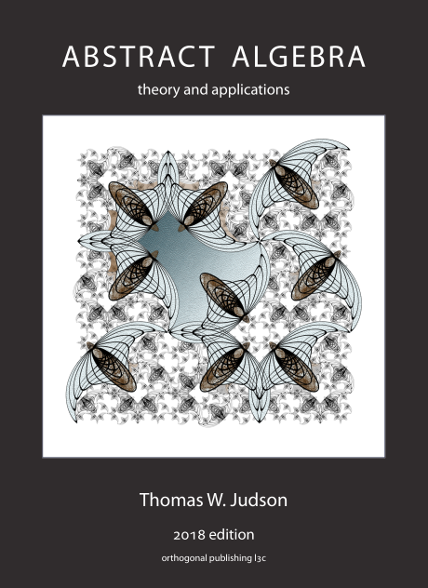Exercises 6.5 Exercises
1.
Let \(z = a + b \sqrt{3}\, i\) be in \({\mathbb Z}[ \sqrt{3}\, i]\text{.}\) If \(a^2 + 3 b^2 = 1\text{,}\) show that \(z\) must be a unit. Show that the only units of \({\mathbb Z}[ \sqrt{3}\, i ]\) are \(1\) and \(-1\text{.}\)
2.
The Gaussian integers, \({\mathbb Z}[i]\text{,}\) are a UFD. Factor each of the following elements in \({\mathbb Z}[i]\) into a product of irreducibles.
\(\displaystyle 5\)
\(\displaystyle 1 + 3i\)
\(\displaystyle 6 + 8i\)
\(\displaystyle 2\)
3.
Prove or disprove: If \(D\) is an integral domain, then every prime element in \(D\) is also irreducible in \(D\text{.}\)
4.
Prove that the field of fractions of the Gaussian integers, \({\mathbb Z}[i]\text{,}\) is
5.
Let \({\mathbb Z}[ \sqrt{2}i ] = \{ a + b \sqrt{2}i : a, b \in {\mathbb Z} \}\text{.}\)
Prove that \({\mathbb Z}[ \sqrt{2} i ]\) is an integral domain.
Find all of the units in \({\mathbb Z}[\sqrt{2} i]\text{.}\)
Determine the field of fractions of \({\mathbb Z}[ \sqrt{2} i ]\text{.}\)
Prove that \({\mathbb Z}[ \sqrt{2} i ]\) is a Euclidean domain under the Euclidean valuation \(\nu( a + b \sqrt{2}\, i) = a^2 + 2b^2\text{.}\)
6.
Consider the ring of integer polynomials \(\mathbb Z[x]\text{.}\)
Prove that if \(d\) is a greatest common divisor of \(f = x\) and \(g = 2\text{,}\) then \(d\) is \(\pm 1\text{.}\)
Prove that \(\pm 1\) cannot be written as \(sf + tg\) for any elements \(s\) and \(t\) in \(\mathbb Z[x]\text{.}\)
Conclude that \(\mathbb Z[x]\) is not a Euclidean domain.
7.
Let \(D\) be an integral domain with a function \(\nu\) from \(D \setminus \{0\}\) to the set of non-negative integers, which satisfies the second condition of a Euclidean domain, but not necessarily the first. For any nonzero \(a\) in \(D\text{,}\) define \(\nu'(a)\) to be \(\min\{\nu(ab) : b \in D \setminus \{0\}\}\text{.}\) Show that \(D\) is a Euclidean domain with Euclidean valuation \(\nu'\text{.}\)
8.
Suppose that \(D\) is an integral domain and \(a\) and \(b\) are both nonzero elements of \(D\text{.}\) If \(a\) and \(b\) have a greatest common divisor, prove it is unique up to associates. That is, if \(d\) and \(d'\) are both greatest common divisors of \(a\) and \(b\text{,}\) then \(d\) and \(d'\) are associates.
9.
Let \(D\) be an integral domain. Define a relation on \(D\) by \(a \sim b\) if \(a\) and \(b\) are associates in \(D\text{.}\) Prove that \(\sim\) is an equivalence relation on \(D\text{.}\)
10.
Let \(D\) be a Euclidean domain with Euclidean valuation \(\nu\text{.}\) If \(u\) is a unit in \(D\text{,}\) show that \(\nu(u) = \nu(1)\text{.}\)
11.
Let \(D\) be a Euclidean domain with Euclidean valuation \(\nu\text{.}\) If \(a\) and \(b\) are associates in \(D\text{,}\) prove that \(\nu(a) = \nu(b)\text{.}\)
12.
Show that any non-zero, non-unit element \(a\) in a Euclidean domain \(D\) can be factored into irreducibles.
13.
For each of the following integers, is it possible to write it as a sum of two squares? If so, find an expression as a sum of two squares.
\(\displaystyle 52 = 2^2 \cdot 13\)
\(\displaystyle 343 = 7^3\)
\(\displaystyle 3751 = 11^2 \cdot 31\)
\(\displaystyle 7865=5 \cdot 11 \cdot 11 \cdot 13\)
14.
Find four different pairs of squares which sum to \(1105=5 \cdot 13 \cdot 17\text{.}\) Here, we don't count simply reversing the order as a different sum of squares.
15.
Suppose that \(p\) is a prime and \(p \equiv 1 \pmod 4\text{.}\)
Show that it is possible to write \(p^2\) as the sum of two positive squares.
Show that the expression of \(p^2\) as the sum of two positive squares is essentially unique, meaning that if \(p^2 = a_1^2 + b_1^2 = a_2^2 + b_2^2\) then the set \(\{a_1^2, b_1^2\}\) is equal to \(\{a_2^2, b_2^2\}\text{.}\)
16.
Show that \(2x^2 -2x + 4\) is irreducible in \(\mathbb Q[x]\text{,}\) but not in \(\mathbb Z[x]\text{.}\)
17.
Show that \(7\) is irreducible in \(\mathbb Z[x]\text{,}\) but not in \(\mathbb Q[x]\text{.}\)
18.
Let \(\mathbb Z[x^2,xy,y^2]\) be the subset of \(\mathbb Z[x,y]\) consisting of polynomials
where \(c_{ij} = 0\) whenever \(i+j\) is odd.
Prove that \(\mathbb Z[x^2,xy,y^2]\) is a subring of \(\mathbb Z[x,y]\text{.}\)
What are all divisors of \(f=x^3y\) in \(\mathbb Z[x^2,xy,y^2]\text{?}\)
What are all divisors of \(g=x^2y^2\) in \(\mathbb Z[x^2,xy,y^2]\text{?}\)
Show that \(f\) and \(g\) do not have a greatest common divisor in \(\mathbb Z[x^2,xy,y^2]\text{.}\)
19.
Show that \({\mathbb Z}[\sqrt{5}\, i]\) is not a unique factorization domain.
20.
Prove or disprove: Every subdomain of a UFD is also a UFD.
